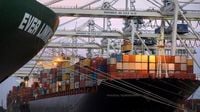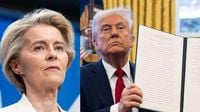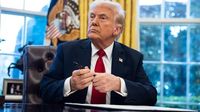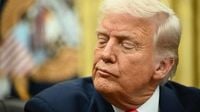On April 2, 2025, U.S. President Donald Trump is set to declare a "Liberation Day," marking a significant escalation in the ongoing trade war with the European Union (EU). This day will see the implementation of new tariffs on various consumer goods and automobiles imported from abroad, a move that has sent shockwaves through markets and raised concerns among European leaders.
According to reports, Trump plans to impose a 25% tariff on cars not produced in the United States, a decision that has been met with strong criticism from EU officials. Bernd Lange, a member of the European Parliament and chair of its trade committee, has labeled the term "Liberation Day" as absurd, instead referring to it as the "Day of Arbitrariness." Lange estimates that this tariff alone could inflict damage in the double-digit billions on the European automotive sector.
Trump's administration has hinted at future tariffs targeting a wide range of products, including mechanical engineering items, copper, semiconductor chips, pharmaceuticals, and even wood. "In Brussels, some believe Trump could impose tariffs on all European products," Lange stated, reflecting the growing unease among EU officials.
Since March 12, 2025, new U.S. tariffs of 25% on steel and aluminum imports have already taken effect, further straining transatlantic relations. Trump has indicated that these tariffs are part of a broader strategy to compel legislative changes within the EU, particularly regarding agricultural consumer protection standards and the Digital Services Act, which imposes regulations on tech giants like Elon Musk's X.
Ursula von der Leyen, the President of the European Commission, has assured that the EU is prepared to respond decisively to Trump's tariffs. "We do not necessarily want to strike back, but if necessary, we have a strong plan to strike back," she asserted during a session in the EU Parliament in Strasbourg. Von der Leyen emphasized that Europe possesses "all means" to protect its citizens and its prosperity.
The EU's potential countermeasures could include reintroducing previously suspended tariffs on U.S. products such as jeans, Bourbon whiskey, motorcycles, and peanut butter. These tariffs were initially put on hold to allow for negotiations but are now expected to be reinstated in mid-April. Furthermore, von der Leyen has indicated that the EU is considering a wide array of responses, including limiting patents, restricting participation in public procurement contracts, and curbing research collaborations with the U.S.
As tensions rise, the EU is bracing for what Lange describes as a "trade war" with the U.S. He stated, "We are already in a trade war with the USA. What comes on Wednesday will be another escalation." The uncertainty surrounding Trump's announcement has left many in Europe on edge, with businesses and politicians alike preparing for the worst.
Trump's plans for the "Liberation Day" have been characterized by his administration as a necessary measure to protect American jobs and industries from what they deem unfair trade practices. His spokesperson, Karoline Leavitt, noted that the president will unveil a tariff plan aimed at ending these practices, although specific details remain unclear.
Market analysts are concerned that Trump's aggressive tariff strategy could lead to a significant economic downturn, both in the U.S. and globally. Economic experts warn that rising tariffs will only exacerbate inflation, contrary to Trump's claims that they will bolster the American economy. The U.S. economy is already feeling the strain, with rising costs for consumers and producers alike.
Last year, trade between the U.S. and the EU amounted to €865 billion, with Germany being a key player in this relationship. In 2024 alone, goods worth €253 billion were traded between the U.S. and Germany, highlighting the importance of this economic partnership. As the largest market for German exports, the U.S. is critical for many sectors, including automotive, pharmaceuticals, and machinery.
In light of Trump's proposed tariffs, EU leaders are exploring various strategies to mitigate the impact. Von der Leyen has called for a strengthening of the European single market, emphasizing the need to reduce bureaucratic barriers and enhance trade opportunities for small and medium-sized enterprises across member states. She stated, "We must unleash the power of the single market."
As the clock ticks down to Trump's announcement, the EU is left to ponder its next steps. Will they retaliate with tariffs of their own, or will they seek a diplomatic resolution? The stakes are high, and the outcome of this trade conflict could reshape the economic landscape for years to come.
The situation is further complicated by shifting global trade dynamics. Countries like Canada, China, Japan, and South Korea are already moving closer together in response to U.S. protectionism. Canada, in particular, has positioned itself as a potential partner for the EU in pursuing free trade agreements that could counterbalance U.S. tariffs.
As the world watches, the question remains: how will the EU navigate this turbulent trade environment? The answer may lie in their ability to adapt and respond effectively to the challenges posed by Trump's administration.
In the end, the unfolding events surrounding Trump's "Liberation Day" will not only impact transatlantic relations but could also set the tone for global trade in the years to come. The EU, armed with a range of options, stands ready to protect its interests and respond to the challenges ahead.









